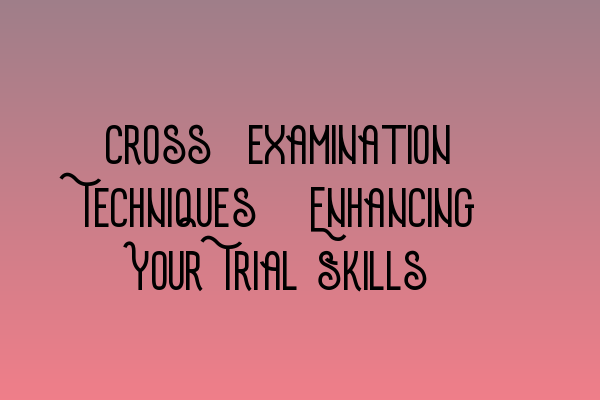Cross-examination Techniques: Enhancing Your Trial Skills
Welcome to the SQE Criminal Law & Practice Law UK blog. In this article, we will explore the art of cross-examination and discuss effective techniques to enhance your trial skills. Cross-examination plays a vital role in the courtroom, allowing you to challenge the credibility and truthfulness of witnesses.
Understanding the Purpose of Cross-Examination
Cross-examination is a crucial component of any trial, serving multiple purposes. It enables you to:
- Expose inconsistencies in witness testimonies
- Impeach the credibility of witnesses
- Obtain additional information to support your case
- Create doubt in the minds of the jury
Therefore, mastering cross-examination techniques is essential to effectively advocate for your client and achieve the desired outcome.
Preparing for Cross-Examination
Preparation is key to successful cross-examination. Before the trial, thoroughly analyze the witness statements, gather evidence, and familiarize yourself with related case precedents. It’s also crucial to anticipate the potential weaknesses in your opponent’s case. Our SQE 1 Practice Exam Questions and SQE 1 Practice Mocks FLK1 FLK2 can assist you in honing your legal knowledge and analytical skills.
Effective Cross-Examination Techniques
1. Leading Questions:
Use leading questions to steer the witness’s answers in a desired direction. This technique allows you to control the narrative and highlight favorable points of your case while effectively cross-examining the witness.
2. Impeaching Credibility:
Through meticulous questioning, you can expose inconsistencies, biases, or motives that may undermine the witness’s credibility. This includes asking about prior convictions, personal relationships, or any potential bias or interest in the outcome of the case.
3. Using Exhibits:
Visual aids can significantly strengthen your cross-examination. Presenting relevant documents, photographs, or other exhibits can help clarify or contradict the witness’s testimony, making your arguments more persuasive.
4. Limited Scope of Cross-Examination:
Focus your cross-examination on areas directly related to your case. Avoid opening new lines of inquiry that could potentially strengthen your opponent’s case or divert attention from your core arguments. Stay strategic and purposeful in your questioning.
5. Controlled Style and Tone:
Maintain a calm and composed demeanor during cross-examination. This approach not only projects professionalism but also maximizes the impact of your questions. Avoid confrontation or appearing aggressive, as it may alienate the jury.
Enhancing Your Trial Skills with SQE Courses
To become a proficient advocate, continuous learning is essential. Our comprehensive SQE 2 Preparation Courses and SQE 1 Preparation Courses provide invaluable resources, including mock exams, study materials, and expert guidance, to enhance your trial skills and prepare you for legal practice. Stay updated with the latest SRA SQE Exam Dates to plan your journey towards qualification effectively.
